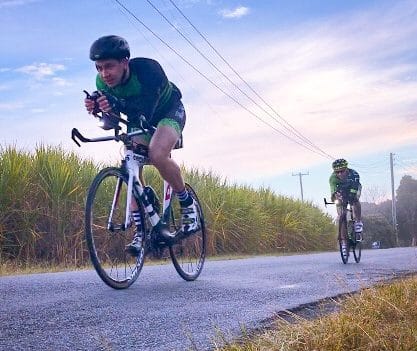There is no such thing as the perfect day.
Take a moment to imagine your perfect race. That race we all strive for where everything clicks without any issues at all. Think about waking up just before your alarm is set to go off, and your body feels full of energy. Your preparation has been fantastic, you have no niggles, you have packed everything the night before and there is no traffic on your way to the venue. You find an all day carpark just meters away from the race course, and as you get everything out of your car, it all fits perfectly inside your bag. You double check to make sure you have everything with you. All your nutrition is there, organised just the way you like it to be. There’s no line at the registration tent, you rack your bike and you pull on your wetsuit, ready to go.
Your wave start moves off. You are at the front of the pack and you swim much faster than your expected pace. You think that you should ease off a little bit but you just feel so good that there is no point in doing that.
Out onto the bike after a perfect transition, you go faster and faster. You are unstoppable. Your pace keeps improving and those other athletes that are used to passing you can only look on, powerless as to how you fly past them as if possessed. Another smooth transition and you are out on the run course. Your legs feel strong and you run with a tail wind in both directions. Then, just when you raise your arms in victory as you cross the finish line, you wake up…
We all dream about the perfect event, that one where absolutely everything goes right, but the reality is that there is no such thing as the perfect day. Not for beginners, not for veterans and not even for professional athletes.
No matter how much you prepare for a race, there is always something that is going to go wrong. Maybe you forget one gel, maybe your bike chain needs some grease or the tyres haven’t been pumped enough, maybe your runners are too worn out. Maybe the problem comes from outside, the water might be too choppy or the weather might not be ideal. But not everything that seems bad is bad. This is where an athletes preparedness and ability to adapt comes into action.
Our triathlon club Melbourne has seen its fair share of the unexpected over the last 12 months. As coaches and athletes, our aim is not to prepare for the unpredictable, because that’s what characterises it; being impossible to predict. Our aim must be to teach and be open to learning how to face chaos and use our strengths and capacities to deal with these situations. These skills are important in triathlon, and equally as important and transferrable to everyday life.
Triathlon, as a mirror of life, is the best teacher if we learn to see the different lessons it has to offer. We live in a world of constant change and new situations. Adaptability is the capacity to effectively respond to change and uncertainty. This is a skill that is associated with optimal physical and mental health by expert psychologists and doctors.
From children to adults, there are many steps we can take to recognise the moments of chaos and challenge in race events and our day-to-day lives and learn from our coaches on how to face them:
- Recognise a changing situation. This can be something like forgetting your gels in a triathlon to your business being shut down during a lockdown.
- Encourage yourself to adjust your thoughts, behaviours and emotions. Is this situation scaring me? Or is it making me angry or frustrated? Or do I consider this an opportunity to grow?
- Remember your strengths and what you have in mind. In Triathlon your endurance, your training and your self-awareness. In your daily life your budgeting skills, your capacity to prioritise, your communication skills.
- Finally, put a plan into action. Make the best out of the situation and make sure to stop and reflect on it once the moment has passed.
Triathlon, as in life, is as an opportunity to grow, to learn about yourself and to develop awareness of your strengths and areas that you need to develop. Triathlon provides the perfect opportunity to learn from coaches and fellow athletes.
Regardless of an athletes age or experience, the importance of adjusting to change and developing resilience has a critical impact on your wellbeing and your ability to race as perfectly as possible.

